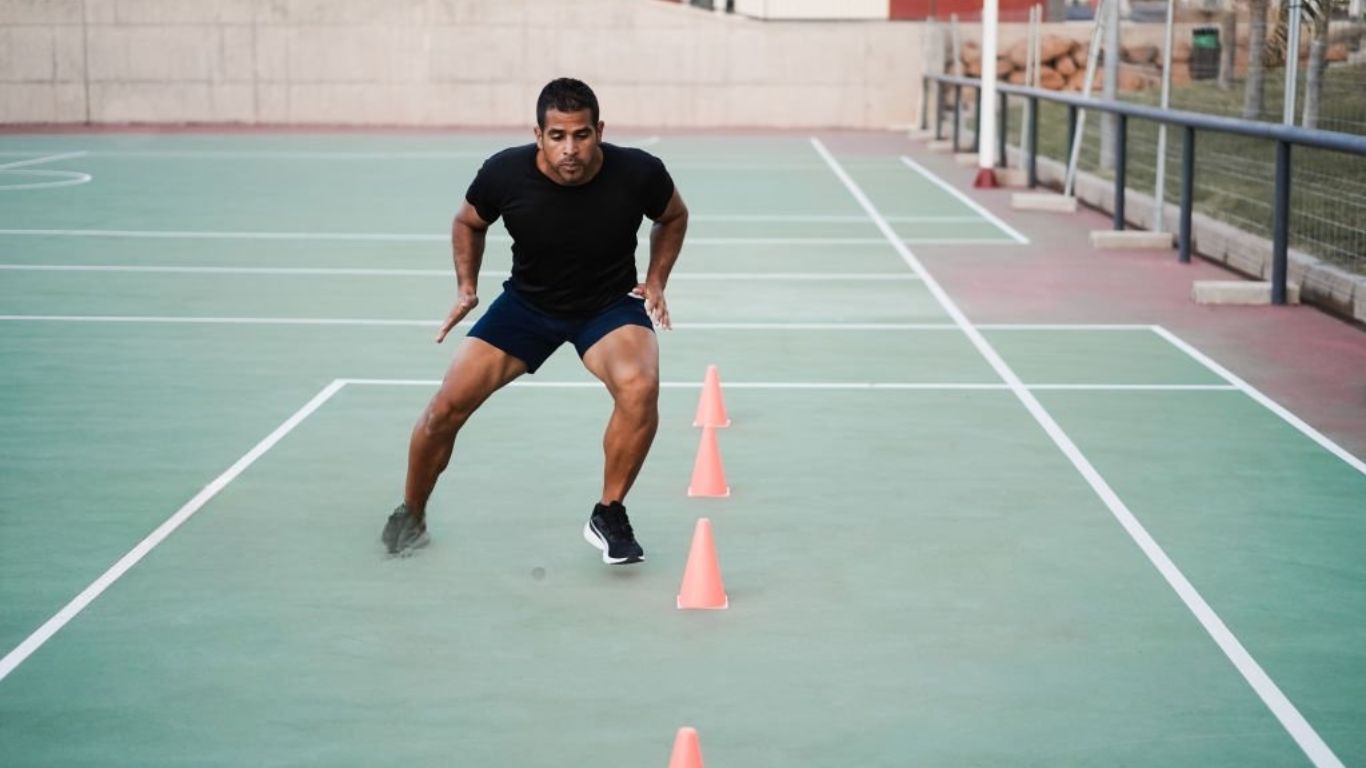Athletes constantly seek ways to enhance their sports performance, and health-related fitness is a cornerstone of this journey. From improving endurance to boosting strength and flexibility, fitness directly impacts an athlete’s ability to perform, recover, and excel. Let’s deeper into health related fitness contributes to sports performance and how athletes can optimize their fitness for peak results.
What health-Related Fitness?
Health-related fitness refers to physical attributes that promote overall health and wellness, enabling individuals to perform daily activities efficiently and participate in physical tasks with reduced risk of injury. Unlike skill-related fitness, which focuses on specific abilities like agility or coordination, health is more holistic, emphasizing longevity sustainability.
Components of Health-Related Fitness
1. Cardiovascular Endurance
This measures the efficiency of the heart, lungs, and blood vessels in delivering oxygen to working muscles. Better cardiovascular endurance ensures prolonged performance with reduced fatigue.
2. Muscular Strength
Muscular refers to the ability of muscles to exert force during activity. Athletes with greater strength can perform explosive movements such as jumping, sprinting, or tackling with higher efficiency.
3. Muscular Endurance
Muscular endurance is the ability of muscles to perform repetitive contractions over time. This is essential for sports requiring sustained effort, like long-distance running or cycling.
4. Flexibility
Flexibility is the range of motion around a joint. It plays a critical role in preventing injuries and enhancing athletic movements.
5. Body Composition
Body composition refers to the proportion of fat, muscle, and bone in the body. A healthy composition supports better energy use and agility.
The Link Between Fitness and Sports Performance
Athletes with optimal fitness levels can perform complex movements efficiently, resist fatigue, and recover faster after exertion. For instance, a soccer player with high cardiovascular endurance can sprint repeatedly throughout the match without a significant drop in performance.
Benefits of Health-Related Fitness
- Injury Prevention: Stronger muscles, flexible joints, and better endurance reduce injury risks.
- Enhanced Recovery: Fit athletes recover faster from intense workouts and games.
- Energy Efficiency: A fit body uses energy more effectively, supporting prolonged activity.
Enhancing Cardiovascular Endurance
Cardiovascular endurance underpins by providing the stamina required for sustained effort. Sports like basketball, soccer, and swimming rely heavily on aerobics to keep players active and focused throughout the game.
Strategies to Improve Cardiovascular Endurance
- Interval Training: Alternating between high and low-intensity workouts boosts endurance.
- Long-Distance Running: Builds aerobic capacity and stamina.
- Cross-Training: Incorporating various activities, like cycling or rowing, prevents monotony and promotes balanced health.
Building Muscular for Athletic Excellence
Strength is foundational to most of your activities. It supports speed, agility, and power, making it essential for you in sports like weightlifting, football, and track events.
Training Techniques
- Resistance Training: Using weights or resistance bands to build your muscles.
- Compound Exercises: Movements like squats and deadlifts engage multiple muscle groups.
- Progressive Overload: Gradually increasing workout intensity ensures consistent development.
Importance of Flexibility
Flexibility of joint range of motion, reducing the likelihood of strains, sprains, or muscle tears. Good flexibility can also achieve better technique and form in their movements.
Stretching Techniques for Athletes
- Dynamic Stretching: Prepares muscles for action and boosts your energy.
- Static Stretching: Helps cool down muscles and prevent stiffness after exercise.
Body Composition and Its Impact on Sports
Every sport has unique demands that dictate the ideal body composition.
For example:
- Endurance Sports: Long-distance runners and cyclists benefit from a lean physique to optimize speed and efficiency.
- Strength-Based Sports: Weightlifters and wrestlers require higher muscle mass for power and explosiveness.
- Team Sports: Soccer or basketball players need a balance of muscle and endurance to support agility and speed.
The right body composition ensures you can meet physical demands.
Tips to Maintain Healthy Body Composition
- Balanced Diet: Consuming nutrient-dense foods supports muscle growth and maintains energy levels.
- Regular Exercise: Combining cardio training promotes fat loss and muscle gain.
- Monitoring Progress: Using tools like body composition analyzers helps track improvements over time.
Designing a Fitness Program for Athletes
A one-size-fits-all approach doesn’t work. Customizing fitness components programs to align with the unique physical demands is essential. For instance:

- Sprinters benefit from explosive power and sprint intervals.
- Gymnasts focus on flexibility and balance.
- Marathon Runners require endurance training and long-distance runs.
Periodization and Progressive Overload
- Periodization: Structuring training into phases—pre-season, in-season, and off-season—helps athletes peak at the right time.
- Progressive Overload: Gradually increasing intensity ensures continuous improvement without overtraining.
A well-designed program better the human body while reducing the risk of burnout and injuries.
The Role of Nutrition in Supporting
Nutrition fuels the body and aids recovery. Key strategies include:
- Macronutrient Balance: Athletes need a mix of carbohydrates for energy, proteins for muscle repair, and healthy fats for endurance.
- Pre-Workout Meals: Eating carbohydrates and proteins before exercise ensures sustained energy.
- Post-Workout Recovery: Consuming protein-rich meals after workouts accelerates recovery.
Importance of Hydration of Sport
Dehydration can significantly impair and increase injury risk.
- Drink water throughout the day.
- Use electrolyte-rich drinks during prolonged activity.
- Monitor urine color as a hydration indicator.
Proper nutrition and hydration are the foundation of sustained sports.
The Psychological Aspect of Fitness and Performance
Fitness isn’t just physical; it’s deeply tied to mental health. Regular exercise:
- Reduces stress and anxiety rate.
- Enhances focus and decision-making during games.
- Builds mental resilience, helping you handle pressure.
Activities to Enhance Focus and Confidence
- Meditation and Yoga: Batter concentration and mental clarity.
- Visualization Techniques: Imagining success boosts confidence and motivation.
- Group Workouts: Training with teammates fosters camaraderie and motivation.
A sound mind complements a sound body.
Tracking and Measuring for Optimal Results
Fitness Assessment Tools
Regular assessments help you identify areas for better. Common tools include:
- VO2 Max Tests: Measure cardiovascular.
- Strength Tests: Evaluate muscle power and endurance.
- Flexibility Tests: Assess joint mobility and range of motion.
Importance of Regular Monitoring and Adjustments
Must adapt their training programs based on assessments. For instance:
- If endurance is lagging, incorporate more cardio.
- If flexibility is limited, prioritize stretching exercises.
Tracking progress ensures steady improvement, when it matters most.
Conclusion
Health-related fitness is a cornerstone of athletic performance. It encompasses endurance, strength, flexibility, and body composition—all essential for excelling in sports. A fit athlete not only performs better but also recovers faster and stays injury-free.
To maximize, you must adopt a holistic approach. This includes regular exercise, proper nutrition, mental conditioning, and ongoing assessments. By addressing every aspect of health, they can unlock their full potential and achieve their goals.
FAQs
- What are the main components of health-related fitness?
The five key components are cardiovascular endurance, muscular strength, muscular endurance, flexibility, and body composition. - How does flexibility contribute to better sports performance?
Flexibility improves joint mobility, reduces injury risk, and enhances the efficiency of athletic movements. - Why is nutrition important for athletes?
Nutrition provides the energy and nutrients needed for optimal performance, recovery, and overall health. - Can mental fitness improve athletic performance?
Yes, mental fitness enhances focus, reduces stress, and builds resilience, all of which contribute to better performance. - How often should athletes assess their fitness levels?
Athletes should assess their fitness every 4–6 weeks to track progress and adjust their training programs as needed.

